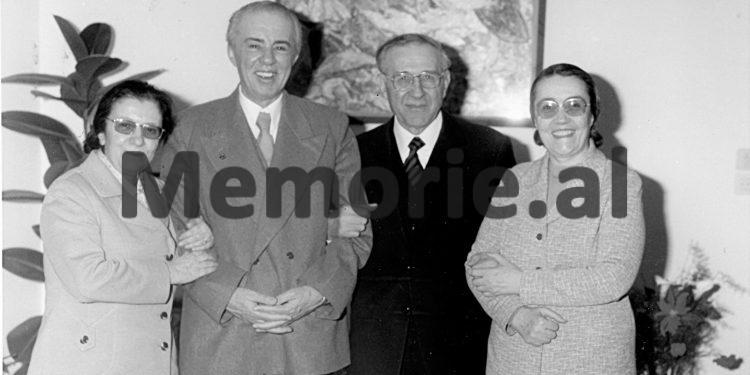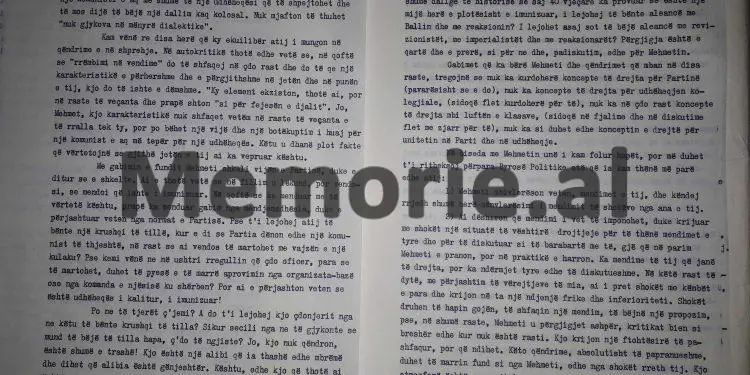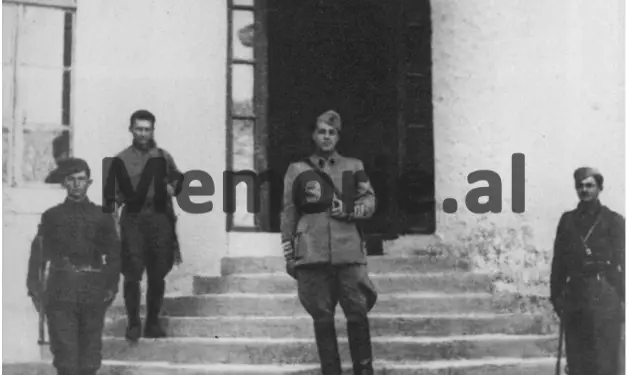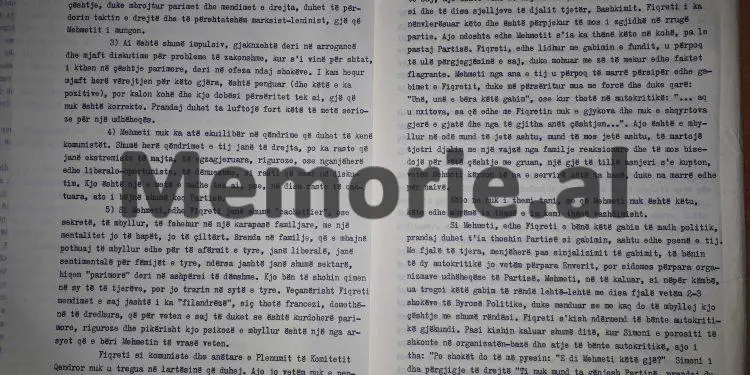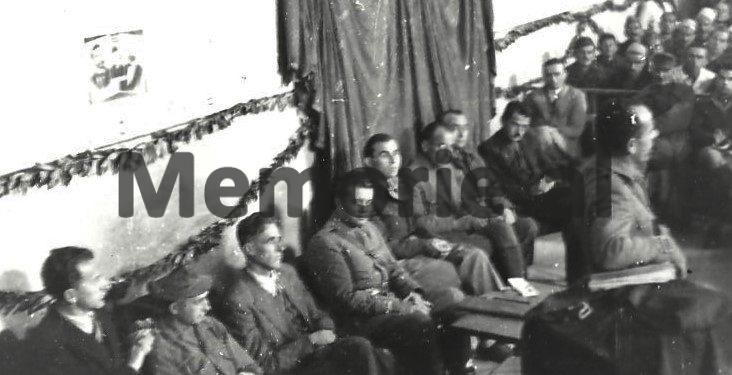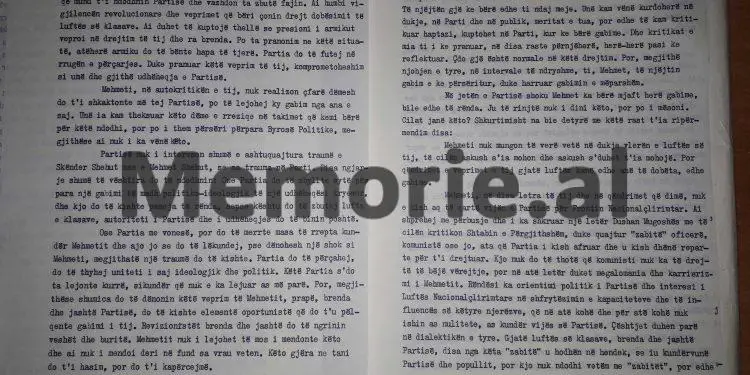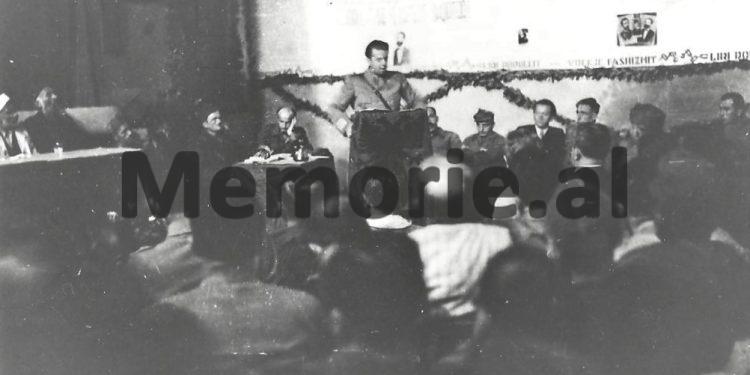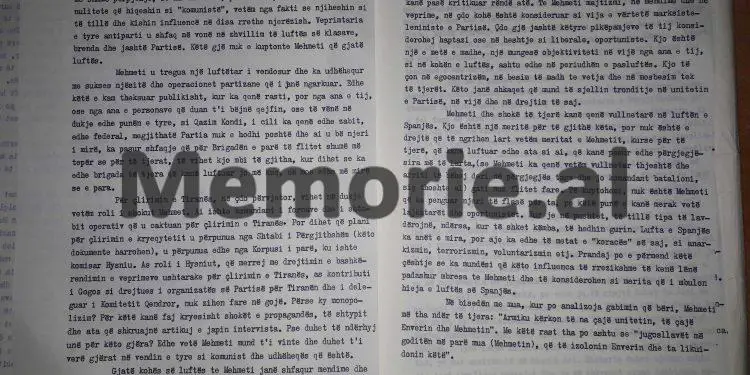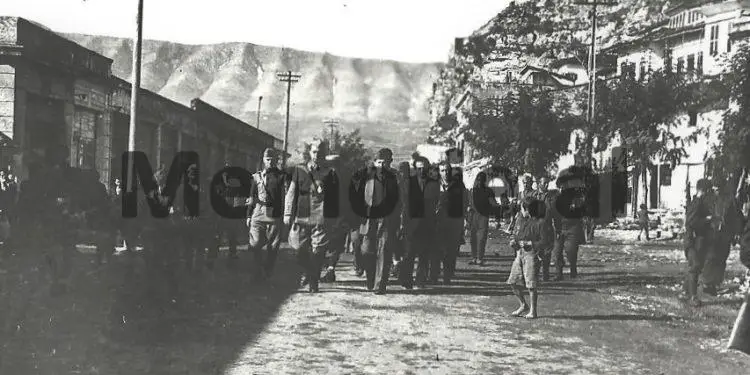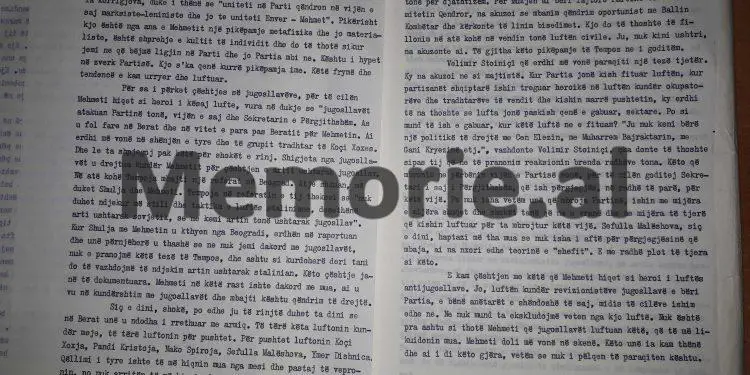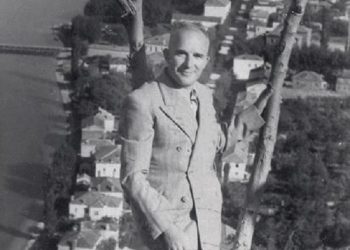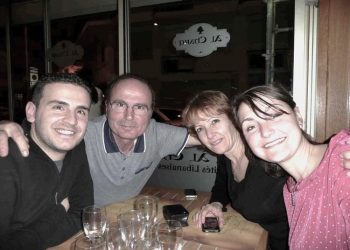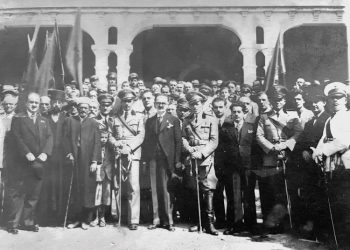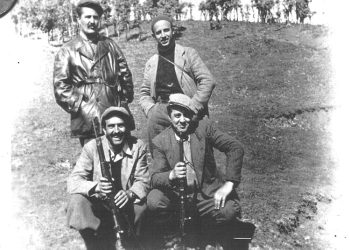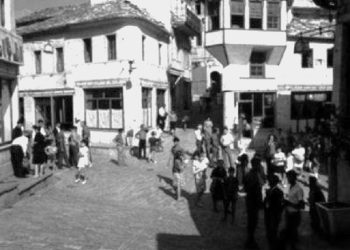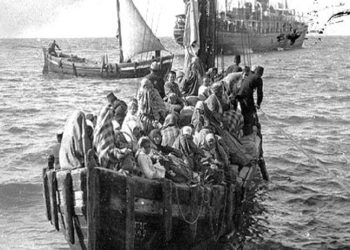Dashnor Kaloçi
Part forty-six
Memorie.al publishes some documents issued by the Central State Archive (fund of the former Central Committee of the ALP), where there is a voluminous file with archival materials which bear the logo ‘Top secret’, which belong to the period of years 1981-1982, with reports, reports, evidence, information, minutes of the meetings of the Politburo and the secretariat of the Central Committee of the ALP, etc., starting from what was held to review and analyze the self-criticism of the former Prime Minister Mehmet Shehu in December 1981, because he had allowed the engagement of his son, Skënder, “with a girl who had some political fugitives in her family circle”, the marathon meeting of the Politburo on the afternoon of December 17 his year that continued until the late hours of that night, where that problem was discussed with the debates and discussions of all members who “crucified” former Prime Minister Shehu, the meeting of the morning of December 18, after the news that Prime Minister Mehme t Shehu had killed himself, the marathon meeting of the Secretariat of the Central Committee of the ALP on September 20, 1982, with the topic: “Analysis of serious mistakes of Kadri Hazbiu, committed during the period when he was deputy minister and minister of Internal Affairs ”, where Enver Hoxha initially started accusing Kadri Hazbiu, luring him as a“ loyalist of the Party ”, (in order for him to“ open his heart to the Party ”, speaking against former Prime Minister Mehmet Shehu) , where at the beginning of his speech, Enver said: “After the coup in the army, we discovered the traitorous group in economics of Abdyl Këllez, Koço Theodhos and Kiço Ngjela with friends. We also discovered this group here; it was not discovered by the State Security. The same can be said about the discovery of the group of Fadil Paçrami, Todi Lubonja and a number of other people connected with them, such as Ismail Kadareja with friends, the Security did not reveal, but that hostile work was discovered by the Committee Central, etc. ”! All these and other documents with the logo ‘Top secret’, will be published in several issues in a row, exclusively by Memorie.al.
Continued from the previous issue
Archive document ‘Top secret’ with the minutes of the meeting of the Politburo dated December 18, 1981, which took place without the presence of Prime Minister Mehmet Shehu, after a few hours ago, he was found dead in his room sleep!
ALBANIAN LABOR PARTY Secret
CENTRAL COMMITTEE
-General Sector-
PROCESS – VERBAL
OF THE MEETING OF THE POLITICAL BUREAU OF THE CENTRAL AFFAIRS OF THE ALP DATES
17 E 18 DECEMBER 1981
FIFTH SESSION
COMRADE ENVER HOXHA: With the last mistake, Mehmeti violated the Party line, knowing that he was violating it. He tells himself that at first he shook, but decided, that he thought he was immune. If he really thought so, he still thought wrongly out of arrogance, excluding himself from the norms of the Party. Why should he be allowed to make such a marriage, when he knows that the Party condemns even a simple communist, if he decides to marry the daughter of a kulak? Why did we put in the army the rule that every officer, before getting married, must ask for and get approval from the base organization or from the command of the unit where he serves? But he excludes himself from being a seasoned, immune leader!
What about the rest of us? Will any of us be allowed to make such marriages here? Had each of us judged that he could take such steps, any stick? No, that’s not true, it’s too thick! This is an alibi I told him last night and it is known that the alibi is a lie. Thus, even what he says is a lie.
The mistakes that Mehmeti has made and the attitudes he holds in some cases, show that there are no right concepts for collegial leadership, there are no right concepts for class struggle in any case, and there is no right concept for unity in the Party and in leadership.
In conversations with Mehmet, I have spoken openly, but I have to reiterate in front of the Politburo what I have said to him before:
- Mehmet overestimates himself, his thoughts and hence many times underestimates the opinion of his friends.
- He wants his opinion to be imposed, creating with his friends a difficult situation of shyness, to say their opinions and to discuss as equals with him, which in principle Mehmeti accepts, but in practice forgets. There are his thoughts that are right, except for my remarks, he welcomes friends with front legs and creates in them a feeling of fear and inferiority. Friends are afraid to open their mouths, to express an opinion, to make a proposal, because in many cases, Mehmet responds harshly, criticism falls like hail even when it is not the case. This creates a coldness that does not show, but that is felt.
- He is very impulsive, hot-tempered to the point of arrogance and a lot of discussions about common problems, when they do not suit him; he turns them into principled issues, to the point of insulting his friends. I have warned him many times about these things, he has repented (and he has this positively), but time passes and this weakness is repeated in him, which is not correct.
- Mehmeti does not have the balance in attitudes that communists should have. Many times his attitudes are right, but there are cases that are left-wing extremists, exaggerated, rigorous, or sometimes even liberal-opportunistic, punishable, as the case we are discussing. This is a big flaw in him, why, in certain cases, they do the Party a lot of harm.
- Both Mehmeti and Fiqreti are very “cachottier”, or secrets, closed, hidden in a family carapace, with a mentality that is not open, not open. Inside the family, who keep it almost closed even to their relatives, are liberal, are sentimental to their children, while outside are very sectarian, and removed “principled” to harmful severity. This makes them see the hair in the eyes of others, but not the beam in their own eyes. Fiqret, in particular, has her thoughts abroad “Finnish”, as the Frenchman says, that is, twisted, so that for her it seems that she is always principled, strict and exactly this closed psychosis is one of the reasons that made Mehmet kill you.
Fiqret, as a communist and a member of the Plenum of the Central Committee, did not show the height he needed. Not only did she not prevent Mehmet from making this mistake, but she made mistakes herself in this case, as well as in several other cases. Young friends should know that during the war, Fiqreti was expelled from the Party, precisely because of acts of terrorism. Fiqreti did not play the role of a communist and a mother in her family. As various friends of the Party and its circle tell us, she has been made aware of Skënder’s immoral attitudes, as well as of some of the behaviors of the other son, Bashkim.
Fiqret has underestimated these and has tried not to solve them in a party way. She probably did not say this to Mehmet in time, let alone to the Party. Fiqret, even in connection with the last mistake, tried to reduce her responsibility, denying in a weak voice even the flagrant facts. Mehmeti, for his part, tried to take over Fiqret’s mistakes, repeating them to me loudly and crying: “I, I, made this mistake”, or when he says in self-criticism: “u I was in such a hurry that even with Fiqret I did not judge and did not examine the issue extensively and from all sides… ”! She is locked in the room, it may be so, it may not be so, the other should marry the boy to a girl from a reactionary family and not talk about this issue with the woman, no one understands such a thing, only Mehmeti asks to serve us this to eat, taking us even for naive.
We do not say this now, since Mehmet is not here, we said it to him last night, and we have said it over and over again.
Both Mehmeti and Fiqreti made this big political mistake, so they had to tell the Party both his mistake and his reason. In other words, immediately after signaling the mistake, they both made self-criticism not only in front of Enver, but especially in front of the leading bodies of the Party. Mehmeti, in the past, as if on foot, easily showed this serious mistake in a few words to only 2-3 friends of the Politburo, thinking that this would close this very important issue. Fiqret Ski intends to do self-criticism somewhere.
Many days had passed, when Simon ordered her to go to the grassroots organization and do self-criticism there, she said: “But my friends will ask me: ‘Does Mehmeti know this?’ Simon gave the right answer: “You cannot lie to the Party, so you must tell them: Mehmet knows and he is as wrong as I am in this matter.” It is clear that Mehmet’s and her authority preoccupied them more than the Party’s authority, enforcing norms and defending its interests.
Mehmeti, in his self-criticism, does not realize what damage he would cause further to the Party, could this mistake be allowed by her. I have pointed out these damages and dangers to him in the meetings we have had about this incident, but I am telling him again in front of the Politburo, even though he has not put these.
The party is not more interested in the so-called trauma of Skënder Shehu or Mehmet Shehu, than the trauma in the Party. Some very difficult events will take place: Either the Party would turn a blind eye to a major political-ideological mistake of a leading leader, and this would have serious consequences, because it would soften the class struggle, the Party authority and of leadership would fall down. Mehmet is not allowed to not think these and he did not think until the end until he killed himself. We will now face these things, but we will overcome them.
I told Mehmet this and I am telling him before you: You love the Party and you fought for it. This is not discussed. Personally, as a communist friend, I loved and respected you. You did the same to me. I have always pointed out, in the Party and in public, your merits, but I have also openly criticized you, of course in the Party, when you have made mistakes.
In the life of the Party, Comrade Mehmet has made many mistakes, even serious ones. You young people do not know this, but you will learn it. What are these? In short, it is our duty, on this occasion, to mention a few: Mehmet does not fail to point out the value of his war, which no one denies and no one should deny. But his attitudes and actions during the war have both weaknesses and mistakes.
Mehmeti, in some of his letters and in the positions we know, was not so clear about the Party’s line for the National Liberation Front. He expressed contempt and wrote a letter to Dusan Mugosha, criticizing the General Staff, calling the “officers” officers, communists or not, those whom the Party had approached and given units to direct. This does not mean that the communist has no right to make remarks, but that letter shows Mehmet’s megalomania and careerism. The political orientation of the Party and the interest of the National Liberation War in the use of the capacities and influence of these people are important, which at that time and for that time were neither nullity nor against the Party line.
For the liberation of Tirana, on each anniversary, only the role of comrade Mehmet is noted. He was the commander of the forces and the Operational Staff that were assigned for the liberation of “Tirana”. But it is known that the plan for the liberation of the Capital, was elaborated by the General Staff (these documents are forgotten), was also elaborated by the First Corps, where Commissar Hysniu was. Neither the role of Hysni, who was in charge of directing and coordinating military operations for the liberation of Tirana, nor the contribution of Gogo, as the leader of the Party organization for Tirana and the delegate of the Central Committee, are mentioned at all. Why this monopoly? This is mainly the fault of propaganda comrades, the press and those who write articles and give interviews. Why should I intervene for these things? Mehmet himself could and should put things in their place, as a communist and a leader he is.
During the war, Mehmeti had thoughts and condemned, anarchist and terrorist acts. He has massacred villagers and these actions harmed the War and did not help him. Mehmeti and other comrades were volunteers in the Spanish War. This is a merit for all of them, but it is not right for only Mehmet’s merits to be raised, while for others, who have fought like him, who have also had higher responsibilities, (that Mehmet has been only a simple volunteer and managed to become a platoon commander and not a battalion commander, as he said), almost not spoken at all.
Understandably, it was not Mehmet who prevented anyone from talking about them, but the flatterers and opportunists themselves are concerned about this matter. When you are in power, such guys praise you, while when your foot slips, they throw the stone. The Spanish war has its good sides, but it also has the shortcomings of its “armor”, such as anarchism, terrorism, voluntarism, etc. I am therefore mentioning this issue that it is possible that these dangerous influences have inadvertently left an impression on Mehmeti and are considered as a merit covered by the shadow of the Spanish War.
In the conversation with me, when I was analyzing the mistake he made, Mehmeti told me, among other things: “The enemy wants to break our unity, to break Enver and Mehmet”. On this occasion he also said that “the Yugoslavs hit me first (Mehmet, to isolate Enver and liquidate this”.
Both of these views are not right, I opposed and corrected them, saying that “unity in the Party lies in its Marxist-Leninist line and not the Enver-Mehmet unity.”
Regarding the issue of Yugoslavia, for which Mehmet is removed as a hero of this war, I noted that “the Yugoslavs attacked our Party, its line and the Secretary General. Nor was there any talk in Berat and in the first years after Berat about Mehmet. He later came to the mark of them and the traitorous group of Koçi Xoxes. And let me explain this a little bit too new friends. The arrow from the Yugoslavs was aimed at Mehmet, on the issue of Yugoslav martial arts.
At the time, Tempo was delivering a lecture in Belgrade. They went there, I think Shulja and Mehmeti. Tempo stressed in his speech that “the style and tactics of the Stalinist war, that is, the Soviet martial art, should no longer be followed, that we have our own Yugoslav martial art.”
As you know, friends, you young people should also know that in Berat I was surrounded by enemies. All of them fought against me, all of them fought for power. Koçi Xoxja, Pandi Kristoja, Nako Spiroja, Sejfulla Malëshova, Ymer Dishnica fought for power. Their goal was to remove me from the middle and then act, but they could not remove me. History should be known as events unfold and not written according to the subjective desires of some. All of the above attacked me, because they wanted to attack the Party line.
Velimir Stoinic who came later presented another thesis. He accused us of being leftists. When our Party had won the War, when the Albanian partisans had shown heroism in the fight against the occupiers and traitors of the country and had taken power, he came to tell us that our Easter War was wrong, sectarian. But how could the former be wrong, when we won this war? “You have not made a fair policy with Cen Elez, Muharrem Bajraktar, Gani Kryeziu, etc.”, continued Velmir Stoiniçi, which according to him meant that we should accept the reaction within our ranks. Sejfulla Malëshova, as you know, openly told me that I was not capable of the responsibility I held, he also brought out the theory of the “boss”. And many more like these.
I have the issue with Mehmet being removed as the anti-Yugoslav ‘Hero of War’. No, the fight against the Yugoslav revisionists was waged by the Party, made by its sound members, among whom we were. We cannot exclude ourselves from this war. It is not like Mehmet says that the Yugoslavs fought this, to liquidate me. Mehmeti later appeared on stage. These I have said, and he knows these things, but he does not like to be presented as such. Memorie.al
The next issue follows




